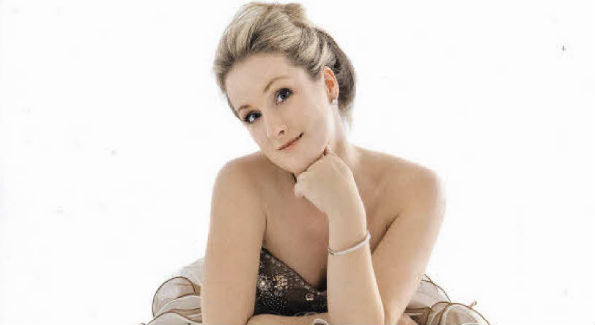Review: Despite battling a cold, soprano Diana Damrau delivers the goods.
By Patrick D. McCoy

Soprano Diana Damrau debuted on the Washington National Opera Celebrity Series with harpist Xavier De Maistre. (Photo by Eric Richmond)
If catching a cold results in a singer performing an absolutely dazzling vocal recital, more perfomers need to go out and catch one immediately. Standing on the stage of The Kennedy Center‘s Eisenhower Theatre, German soprano Diana Damrau disclosed to the packed house that she had fallen victim to a cold. In a time when performers often use sickness as an excuse to cancel, Damrau’s appearance was rewarded with appreciative applause. She performed at the center as a a part of the Washington National Opera Celebrity Series, which marked her debut.
At first glance, the program appeared to be a safe offering of vocal chestnuts, including the staple song repertoire by Schubert and Strauss. On the contrary, Damrau breathed new life into the German lieder, which is often sung in an all too expected manner. It is one thing to hear a person attempt to sing these songs, but it is another to witness them flow off the tongue of a native speaker. Opening her program was an elegantly sung “Stänchen.” The first song in a bouquet of Schubert gems, the soprano rendered it with nice contrasts and a seamlessly phrased vocal line. It is quite difficult to sing a song that has different text with the same recurring musical material. Yet, Damrau made each stanza sound like a new experience.
Harpist Xavier de Maistre was the perfect partner, setting the tone for each piece while remaining attentive to his collaborator. A harpist would not usually be the sole accompaniment for a full vocal recital, but Maistre’s playing showed the full depth of his instrument’s sound and even debunked the ‘delicate’ and ‘angelic’ stereotype that a harp often gets; those attributes were present, but the program also displayed the instrument in a more robust nature. In “Du bist du Ruh,” Damrau revealed a creamy middle range with a lush warm texture. Floating high notes and considerable control marked her interpretation of this standard. The entire Schubert group was impressive, but it was the “Ave Maria” that left the hall transfixed. With the harp wafting around Damrau’s voice like the whispers of angels, the musical offering was an exquisite hymn to the extolled Virgin Mother.
Maistre showed his virtuosic prowess in an original arrangement of Francisco Tárrega’s “Memories of the Alhambra.” It was truly a magical moment, as he entranced the audience with the flashy, technical precision of the instrument. Returning to the stage, Damrau rounded out the first half of the recital with songs by Richard Strauss. Her rendition of “Wiegenlied” was beautiful and interesting in that she sang from the harpist’s much lower music stand, requiring her to almost stoop. Yet it was quite effective and gave off the image of singing tenderly to a child in the manner of a lullaby. “Beim Schlagengehen” revealed a dark, rich sound, which was a preview of the contrast that would be heard in the second half of the concert.
After intermission, the soprano offered gems of the French song tradition: Hahn, Duparc, Fauré, Chausson, Duparc and Dell’Acqua. Her voice seemed to move beyond the surface tonal beauty and blossomed into its core sound. With the audience pulling for her, Damrau could do no wrong. The songs of Hahn allowed the ears of the listener to ride the wave of glistening, brilliant sound, while the offerings by Chausson were introspective in nature – almost probing. Her closing offering of “Villanelle” provided a hint of vocal coloratura that whetted the operatic appetite of the audience. Encores included Bellini’s “Oh! quante volte” and Strauss’ “Morgen.”
Recently named among the Forty Under 40 for his contributions to arts and humanities, Patrick D. McCoy received a B.M. in vocal performance from Virginia State University and a M.M. in church music from the Shenandoah Conservatory in Winchester, Va. He has contributed arts and culture pieces to CBS Washington, The Afro-American Newspaper and the newly published book, “In Spite of the Drawbacks” (Association of Black Women Historians), which includes his chapter on legendary soprano Leontyne Price. McCoy has interviewed some of the most acclaimed artists of our time, including Renée Fleming, Denyce Graves, Norman Scribner, Julian Wachner, Christine Brewer and Lawrence Brownlee. Listen to these interviews and others at Blog Talk Radio. McCoy may be reached via email at wlperformingarts@aol.com and on Twitter @PatrickDMcCoy.
